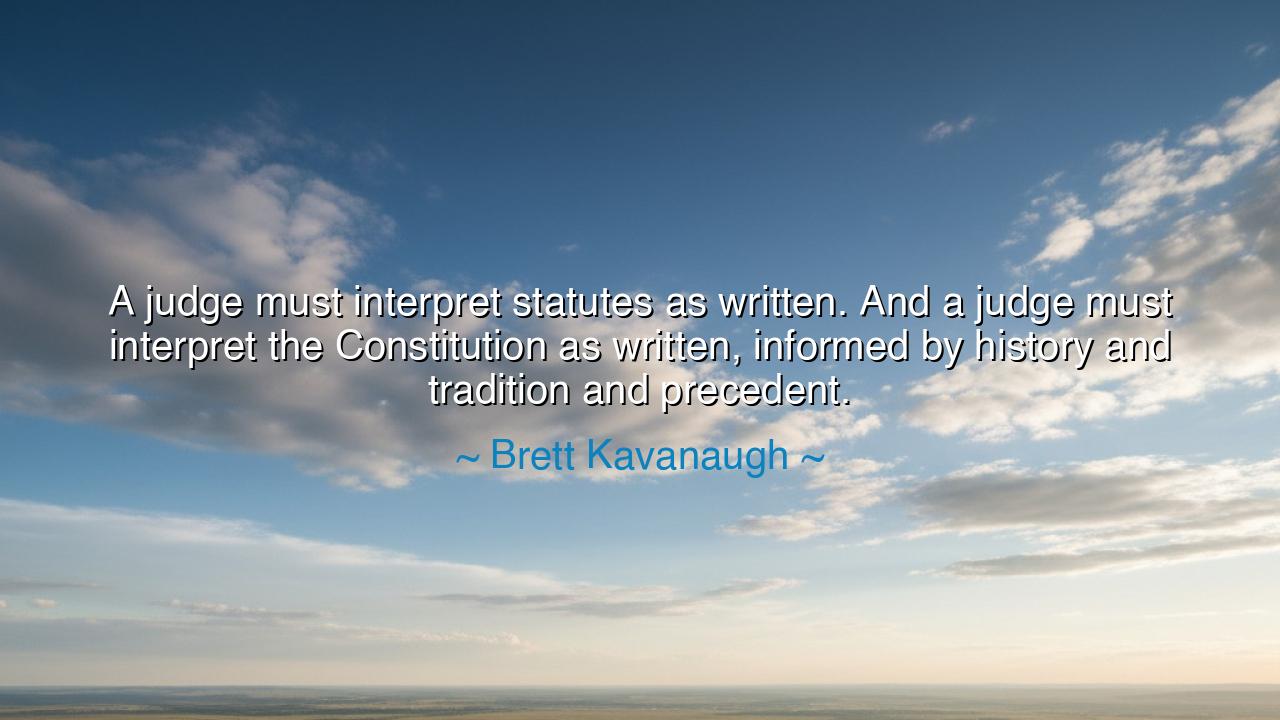
A judge must interpret statutes as written. And a judge must
A judge must interpret statutes as written. And a judge must interpret the Constitution as written, informed by history and tradition and precedent.






“A judge must interpret statutes as written. And a judge must interpret the Constitution as written, informed by history and tradition and precedent.” — Brett Kavanaugh
Thus spoke Brett Kavanaugh, a guardian of the law and servant of justice, whose words remind us of the solemn duty entrusted to those who wear the robe of judgment. In this declaration, he speaks not of power, but of restraint — not of authority unbound, but of discipline within principle. His words carry the ancient wisdom that justice is not born of passion or opinion, but of fidelity to the law itself. For when Kavanaugh says that a judge must interpret statutes and the Constitution “as written,” he invokes a sacred command: that the rule of law must stand above the will of any one man, above the storm of politics, and above the passing tempests of time.
To interpret as written is to honor the words of those who built the framework of a nation. In a world that changes with each generation, these written words — statutes and the Constitution — stand as the compass that guides a people through the centuries. They are not perfect, but they are deliberate, crafted through struggle and vision. Kavanaugh’s statement carries forward the tradition of those who believe in textualism — the idea that meaning is not to be invented, but to be discovered within the language of the law itself. The judge, therefore, must not act as a ruler, but as a steward, preserving the balance between liberty and order, between government and the governed.
This principle is not new. In the earliest days of civilization, when kings sat in marble halls and ruled by decree, law was often the servant of power. Yet the ancients learned that justice dies when it bends too easily to the desires of men. The Romans, too, knew this truth, for they recorded their laws in the Twelve Tables, that all might read and none might rule by whim. And in the centuries that followed, this idea — that law must be written and interpreted faithfully — became the foundation of democracy itself. When Kavanaugh speaks of interpreting statutes “as written,” he echoes this lineage, affirming that freedom endures only when the law remains unchanged by the passions of the moment.
Consider the story of Chief Justice John Marshall, who, in the early days of the United States, presided over the landmark case Marbury v. Madison in 1803. In that decision, Marshall did not invent new powers for himself or the Court — he interpreted the Constitution, as written, to establish the principle of judicial review. It was an act of both humility and courage, for in affirming that the judiciary must interpret the law rather than make it, he preserved the very spirit of the republic. His ruling declared that even the highest officials of government are bound by the written law, and that the Constitution — not ambition, not emotion — must be the final word.
When Kavanaugh adds that interpretation must be informed by history, tradition, and precedent, he acknowledges that written words do not exist in isolation. They are living instruments shaped by the wisdom of ages and the continuity of practice. Precedent, the memory of justice decided before, ensures that each ruling stands upon the stones of those that came before. History and tradition give texture and context to the written word, helping the judge discern its true intent. Thus, the work of a judge is not mechanical, but moral — a balancing of intellect and conscience, a weaving together of the written and the remembered.
Yet there is a warning hidden in his words as well: when judges forget the limits of their role, when they begin to see themselves as creators of law rather than its interpreters, the foundation trembles. For justice cannot rest upon the shifting ground of personal belief. The ancients taught that the judge’s duty is to listen, not to command — to stand firm upon the words that have been entrusted to him, as a priest stands before sacred texts. In every age, nations rise and fall by their fidelity to this principle: that the written law is greater than the ruler who applies it.
So, O seekers of truth and order, take this teaching to heart: wisdom begins with humility before what is written. Whether you are a judge, a leader, or a citizen, honor the power of language — for in the written word lies the covenant between freedom and restraint. Study the past, know the traditions that shaped your world, and respect the precedents that keep it whole. But above all, act with the discipline of one who understands that justice is not the servant of desire, but the guardian of truth.
As Brett Kavanaugh reminds us, the Constitution is not a relic — it is a living oath, calling each generation to interpret it faithfully, as written, and as inherited through history, tradition, and precedent. For when we forget this, we do not merely risk confusion — we risk the very soul of justice itself.






AAdministratorAdministrator
Welcome, honored guests. Please leave a comment, we will respond soon